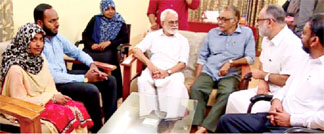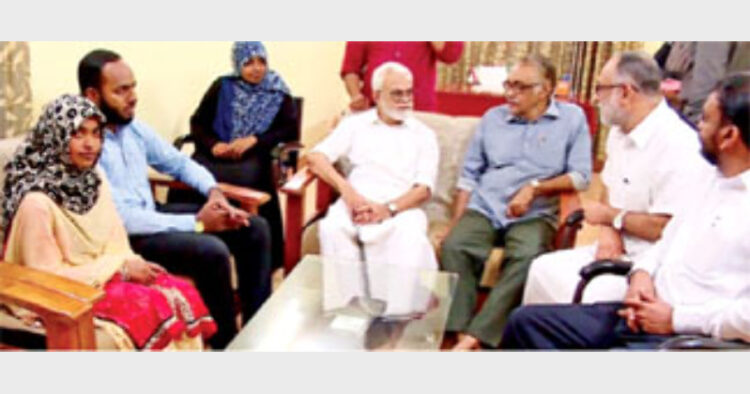 THE Supreme Court restored the marriage of Hadiya aka Akhila with Shafin, setting aside the Kerala High Court verdict that had invalidated it in the context of national security
THE Supreme Court restored the marriage of Hadiya aka Akhila with Shafin, setting aside the Kerala High Court verdict that had invalidated it in the context of national security
Shridhar Prabhu
Supreme Court of India, by its order dated March 8, 2018, allowed an appeal filed by Shafin Jahan against the Kerala High Court’s Division Bench Judgement dated May 24, 2017. Consequently, Hadiya alias Akhila Asokan is at liberty to pursue her future endeavours according to law. The apex court has further clarified that the investigations by the National Investigation Agency (NIA) in respect of any matter of criminality can continue in accordance with law. The apex court, in its brief order held thus:
“…Hadiya alias Akhila Asokan is at liberty to pursue her future endeavours according to law. We clarify that the investigations by the NIA in respect of any matter of criminality may continue in accordance with law”
Since the Supreme Court has only pronounced the operative part of the order and observed further that reasoned judgement will follow, it may be a bit premature to make a complete analysis. However, a limited scrutiny, based on the following legal logic employed, may not be out of place.
“…We hold that the High Court should not have annulled the marriage between appellant No.1, Shafin Jahan and respondent No.9, Hadiya alias Akhila Asokan, in a Habeas Corpus petition under Article 226 of the Constitution of India. We say so because in the present appeal, by special leave, we had directed the personal presence of Hadiya alias Akhila Asokan; she appeared before this Court on 27th November, 2017, and admitted her marriage with appellant No.1”
In India, like any civilised society under the rule of law, freedom of conscience and free profession, practice and propagation of religion by any person is a fundamental right but not an absolute or unbridled. As per Article 25 of our Constitution, this right is subject to public order, morality and health and regulations or restrictions on any economic, financial, political or other secular activity which may be associated with religious practice. Similarly, the right to marry or have sexual relationship with a person of one’s choice too has not been absolute.
There have been several instances in the past where Courts at all levels have exercised what is known as parens patriae jurisdiction, wherein, courts act as legal protectors of citizens unable to protect themselves. In fact, the Kerala High Court, in Hadiya’s judgement, now overturned, had exercised this jurisdiction citing the vulnerable condition of Hadiya’s father Asokan. Kerala High Court had documented many compelling reasons under which it was constrained to play the role of legal protector to Hadiya, under the extraordinary facts of the case. Some of the highlights of the Kerala High Court’s judgement are as follows:
1. Though it is repeatedly stated that Ms. Akhila has got converted to the Islam religion, there was no document evidencing such conversion on record. The name which she is alleged to have chosen, according to a notarised affidavit executed by her on 10.9.2015 is “Aasiya”. When she filed W.P.(C) No. 1965 of 2016, she described herself as Akhila Ashokan @ Adhiya. W.P.(Crl.) No. 25 of 2016 she has sworn to affidavits describing herself as Akhila Ashokan @ Adhiya. Even in the Habeas Corpus petition filed by her father Asokan, in her affidavits, she describes herself as “Akhila Ashokan @ Adhiya”. In the alleged marriage certificate issued by Thanveerul Islam Sangham dated December 20, 2016 produced by the Kerala High Court’s Senior Government Pleader along with a memo dated December 19, 2016, her name is shown as Hadiya, D/o. Akhil Asokan. Thus, going by her own records and depositions, Hadiya’s identity itself was uncertain.
2. Shafin Jahan is an accused in a criminal case. Shafin Jahan may only be a stooge who has been assigned to play the role of going through a marriage ceremony. The alleged marriage is only a sham. The same was intended only to force the hands of courts and to scuttle the proceedings.
3. Shafin Jahan”s mother is already in the Gulf. He was working in the Gulf and is desirous of going back. Therefore, left to him, he would have transported Ms. Akhila out of the country. In the present confusion regarding her name, it would have become impossible to even trace her out had she been taken out of India. There are reports of girls taken out of the country after such conversions, having become untraceable.
4. Not just the Modus operandi but also the player involved in conversion are all the members of radical Islamic organisations like SDPI/PFI/Campus Front etc., are the same as Athira’s Case, which was filed by another hapless father such as Asokan.
Kerala Government’s Senior Government Pleader alleged that in yet another case pending before the High Court, there are inputs suggestive of the fact that the very same activists had advised the girl therein to get married to a Muslim to overreach court proceedings. All the above facts point to the existence of an organisational set up functioning behind the scenes.
It is perhaps under these circumstances documented in great detail by the Kerala High Court in its judgement that the apex court has now granted liberty to NIA to continue investigations in respect of any matter of criminality. The so-called champions of liberty who decried Kerala High Court’s judgement as regressive, ignore that the High Court judgement has received assent of the apex court to this extent.
If Hadiya’s case was a routine appeal that sprang from a habeas corpus matter filed by a fazed parent, there was no occasion for the apex court to permit investigations by NIA despite having granted liberty to Hadiya to pursue her future endeavours according to law. Liberal intelligentsia, and prominently the satraps of leftist controlled women’s organisations, wish to conveniently ignore that it is the explosive details documented in the depositions of Police officers and submissions of Government Pleaders working under their own regime in Kerala that promoted the High Court, and now the Supreme Court, to permit continuance of investigations by NIA.
In fact, in 2010 it was none other than CPM’s veteran leader and Chief Minister of Kerala VSAchunanandan who had accused the PFI of using “money and marriages” to convert non-Muslims with the aim of the Islamisation of Kerala.
Be that as it may. In Hadiya’s case, the apex court clearly bifurcated individual liberty from national security. While it upheld the liberty of an individual to choose spouse of her choice, howsoever objectionable it may be in the social and national context, the leave to investigate criminality associated with this episode, was consciously granted. The left-wing intellectuals may well note the undisputed fact that element of criminality and national security concerns were highlighted in Hadiya’s case by Kerala government’s Advocates representing the State and the police departments in the Kerala High Court, which in turn sprang from the concerns unequivocally voiced in the past by their own former Chief Minister Achutanandan.
(Author is a practising advocate and founder of Navayana Law Offices. He writes on legal matters of social importance)














Comments